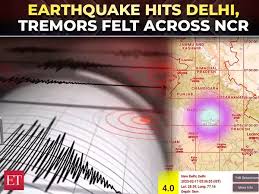Earthquake Strikes Delhi: Recent Events and Safety Insights

Introduction
On October 12, 2023, Delhi experienced a mild but noticeable earthquake, registering a magnitude of 4.5 on the Richter scale. This event has raised concerns among residents regarding the seismic stability of the region. Given that Delhi is situated in a seismically vulnerable zone, understanding such occurrences and their implications is crucial for the safety of its inhabitants.
Details of the Earthquake
The earthquake struck at approximately 2:30 PM local time, with its epicenter located near the Delhi-Haryana border, around 10 kilometers from the city center. Despite its moderate intensity, the tremors were felt across several North Delhi neighborhoods, sending residents rushing out of their homes and offices, seeking safety in open areas.
Local authorities reported several instances of building evacuations, particularly in high-rise structures where residents expressed anxiety about the stability of their homes. Fortunately, there have been no immediate reports of injuries or severe damage. The National Disaster Response Force (NDRF) has been on alert to respond to any potential emergencies following the quake.
Historical Context
Delhi has a history of seismic events, but significant quakes remain relatively rare. The last major earthquake in the region was recorded in 2016, emphasizing the need for ongoing preparedness amongst residents and city planners. Experts state that continued urban development must incorporate safety measures against potential earthquakes to safeguard residents and infrastructure.
Safety Measures and Guidelines
In light of recent events, authorities have reiterated the importance of earthquake preparedness. Here are essential safety measures to consider:
- Identify safe spots in your home, such as under sturdy furniture.
- Keep an emergency kit with essential supplies like food, water, and medications.
- Participate in drills and learn about emergency evacuation plans.
- Stay informed via government alerts regarding seismic activity.
Conclusion
The recent earthquake serves as a reminder of the inherent risks associated with living in a seismically active region. While the tremors were not destructive, public awareness and preparedness are key in mitigating potential risks in future events. Authorities encourage residents to take precautions and remain vigilant. Continued research and urban planning aligned with seismic safety standards are essential for ensuring the safety and resilience of Delhi’s infrastructure. Looking forward, the city needs to enhance its disaster response mechanisms and foster a culture of preparedness among its citizens.









